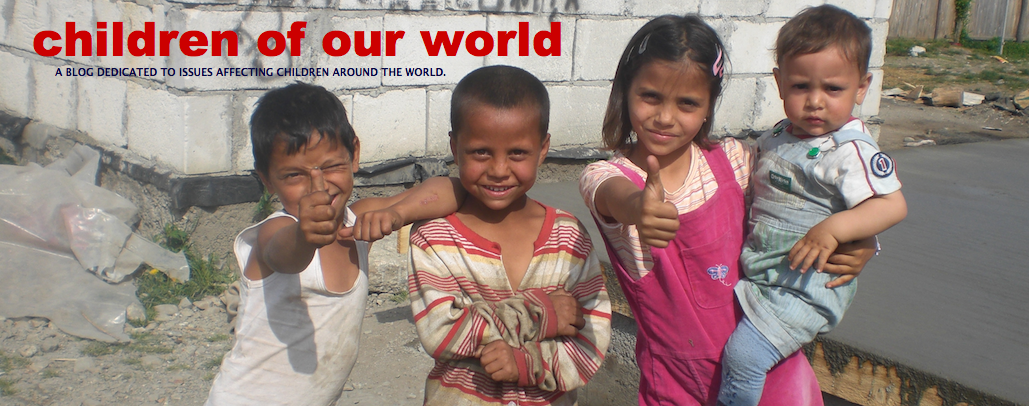Yesterday, I attended the Parliamentary Launch of the Children's Rights and Business Principles in the UK, at the House of Commons. The Principles set out business actions to respect and support children's rights. Read on to find out what was discussed at the launch!
We started by watching the video below, which gives each of the ten Principles. You can also read them here.
Children's Rights and Business Principles
We then heard from the following speakers: David Bull, the Executive Director of UNICEF UK, David Harris, the Director of Responsible Investment of the FTSE Group and Karen Johnson, the Responsible Business Advisor from the Private Sector Department of DfID. MP Jeremy Lefroy chaired the discussion.
Developing the Principles
UNICEF, the UN Global Compact and Save the Children worked in partnership to develop the ten Principles. Children aged from seven to seventeen, in nine countries in the Global South, took part in a consultation process. You can download the children's feedback and the report written on their consultations from this page on the Business and Children Portal. David Bull told us that these children included street children, children with disabilities, child soldiers and child labourers.
A variety of other consultations also took place - with the private sector in the Global North and South; regionally with businesses; and with the public though the Business and Human Rights website.
David Bull said that corporate social responsibility usually took into account child labour, but this was too narrow a conception and the Principles go beyond this. They look at children's rights in the workplace, and in the market place. They are concerned with business' responsibilities within the community where they operate. They refer to looking after and protecting the environment, which children depend on to grow healthily. They look at children indirectly too, with regards to work practices concerning mothers and caregivers.
How will the Principles be put into Effect?
Jeremy Lefroy, stated how important it was that the Principles do not just remain on paper, but that action is taken to implement them. Various ways to ensure that businesses implement the Principles were discussed. David Harris from the FTSE Group said that the Principles would affect different sectors in different ways. For example the food and drink sector should take into account issues such as childhood obesity and underage drinking, and the communications sector should think about protection for minors using social media.
Before looking in more detail at possibilities for implementing the Principles by businesses, it must be noted that David Bull emphasised that under the UN Convention on the Rights of the Child, the primary responsibility for children's rights rests with governments. It is hoped that the Principles will inform legislation. Ideally, businesses would take up implementation of the principles, but governments must effectively regulate companies which do not respect children's rights. Businesses should face consequences if they exploit children, whether directly or indirectly
Businesses and Implementation of the Principles
These were the main points discussed:
- For the Principles to have effect, companies must be monitored, be accountable, and must not be given credit where it is not due.
- The FTSE Group can independently monitor companies, which is better than companies monitoring themselves. The Principles then have the chance to be properly and independently assessed.
- David Harris talked about the FTSE4GOOD Index Series, which measures how environmentally and socially responsible companies are. The Principles will be a vital measurement for this Index. Research will be commissioned through IRIS against companies in the FTSE4GOOD Index to see how well they are implementing the Principles.
- The implementation issue is not about philanthropy, but about business. Karen Johnson said that to be properly effective, it must make business sense to implement the Principles and this should resonate with the core decision makers of a company - not just the corporate social responsibility department.
- The Principles must be integrated into existing policies, management and public reporting, to be effective.
- Businesses should be made to see that happy and healthy children are better for the communities in which they operate. Children can be consumers; their parents are in the work force; and the children make up the future talent pool for businesses.
Other issues were also brought up during the question and answer session. The Principles were formulated to be as broad as possible for all types of businesses across the world, but it was impossible to encompass all factors, and the principles may not be so helpful with regard to the informal sector. It was also noted that the FTSE Group deals with the largest, registered companies in the world and so would not assess smaller businesses. Reputation is important to businesses though, even if they are small, and this would hopefully encourage them to implement the Principles.
What Happens Next?
David Bull said that it is important to disseminate the Principles as widely as possible. According to UNICEF's Corporate Social Responsibility website, a launch event for the Principles took place in Sweden today and such events will also happen in Moldova and China next month. It is vital that business leaders know about the Principles, so that they begin to be implemented. David Bull also told us that UNICEF should be producing a workbook which will offer some guidance to help businesses implement the Principles.
Businesses have far reaching impacts on children, and this is a good initiative to try to ensure that they respect and support children's rights. Jeremy Lefroy observed that he cannot see any of the Principles being burdens on a company. Let us hope that the Principles can be publicised and then effectively implemented, to reduce (and hopefully stop) business' negative impacts on children and build on, and improve, their positive effects.











